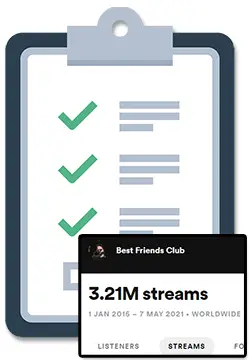When you are first starting out making music it can be hard to tell if it is bad to use loops in music, so I researched the topic of using loops and wrote an article to help answer this age-old question.
No – using loops in music is 100% okay. It is a good thing to use loops in music because it can help you make music faster and kick-start the creative process. Just make sure to use music loops in moderation and try to modify them whenever possible.
Although using loops in music is okay to do, other producers can see this as lazy or uncreative even though the casual listener won’t care at all. There are some things to consider when deciding if you should use loops in your music as well as some simple steps you can take to use loops as creatively as possible.
Is It Good Or Bad To Use Loops In Your Music?
I previously wrote about the topic of whether or not using sample packs is considered cheating, and a lot of the same principles apply here. The biggest difference between using a sample in a sample pack and using loops is this:
Because loops are longer pieces of musical work created by another artist, using their work unaltered can look bad to some other creatives (like producers, artists, etc.)
However, there are a two main things to consider here:
- The artist who created the loop intended for other artists to use their work and, on top of that, they have literally given you written consent to use their work. Of course, you need to be obtaining their work legally for this to apply, so make sure you buy your dang sample packs.
- If you are making music for fans of music instead of producers, then write this down: casual music listener’s don’t care that you are using loops, they just want to listen to good music.
Where things could get more complex is when you are making music for other people in the music industry (ie: other artists or a label) or if you plan to make money off this music (ie: Spotify or CD sales).
In these instances, you will want to make sure that you are safe legally and that you are producing a final product that the person you are creating for is happy with.
So – whether you are making music for other musicians (ie: rappers, vocalists, etc.), a label that doesn’t want to deal with having to clear samples, or if you simply care what other producer’s think, I’ve researched everything you will need to know on whether you should use loops in your music or not.
What if you are making music for other musicians?
If you are debating on use loops or not, and the final result is that you will be sending or selling this music to other musicians, then there are a few things to consider.
In most cases, it really just depends on what they are looking for and what they are okay with.
The best course of action here is to simply ask them if it is okay to use loops. After all, in this scenario they are your client and you need to make them happy at the end of the day.
If they are not okay with loops but you really rely on loops in your productions, then you have two options:
- See if they will consider allowing non-melodic loops. Loops without any noticeable melody (like drum loops) are very, very safe when it comes to copyright and even anyone really noticing. See if the person you are making music is okay with this, if not:
- Use loops to start the music, but then reproduce the loop yourself to finish the music. I personally, had to do this myself when working with a label in 2020 and this would be my advice: simply take the time to analyze the loop, try your best to completely re-create it, and then find some small ways to add your spin on it.
You can also educate yourself more on copyright by starting with finding out if drum loops copyrighted.
What if you are making music for a record label?
When it comes to dealing with a label on the issue of using loops, it comes down to what the label is okay with and what will be in the record contract. If the label is okay with using loops (either because they don’t care or will clear any copyright issues for you), then you are obviously in the clear.
However, still watch out here because in the contract there could be line basically stating any copyright issues or disputes will be paid by you and not the label.
What they are saying is if anyone hits you with a copyright claim and the label needs to hire lawyers to settle things, you are paying for the lawyer and legal fees.
In this instance, it is super important to triple-check what is okay with the label, review the heck out of that contract, and to save the most grief: avoid using loops in general when contracts get involved.
In 2020, I had worked on some remixes where the label was okay with loops as long as they weren’t melodic loops. However, I found out about this well after I had made the remixes and the label approved them for release.
What I had to do was slowly go through the project file looking for any melodic loops and then re-create them myself with my own spin. To be honest, it was kind of fun and I can tell my production skills improved because of it!
What if you care what other producers think?
I got real simple advice here: don’t care what other producers think. In most cases, any negativity from other producers is coming from a place of jealousy or elitism.
Stay in your lane, and focus on putting out as much great music as you possibly can. The more you release, the more you will improve as a producer and the more you will grow a fanbase.
Fun fact: releasing music consistently on Spotify is a great way to make sure you won’t be in a situation where you are wondering why your Spotify streams went down.
Here are some counter arguments you can use to stuck-up producers saying it is bad to use loops:
- The artist who created the loop intended for other artists to use their work.
- The artist who created the loop has literally given you written consent to use their work.
- The people you are making music for don’t care that you are using loops, they just want to listen to good music.
If it’s important for you to not use loops, simply focus on figuring out how to create your own loops. It will take more time but if that is what you need to feel fulfillment as a music producer then go for it.
Just remember it is okay to use loops in music.
7 Simple Steps To Use Loops In Original & Creative Ways
If you’ve been working on new music and dropping in loops without changing them at all, it may be a good idea to either learn how to re-create the sounds that you want or simply learn how to get more creative with pre-made loops.
Although there is an endless amount of ways you can get more original and creative with loops, I’ve included 7 of my personal favorites (that I actually use every day) to get you started:
- Transient Shaping / Gating. Using Ableton‘s warp markers, the transient control in Ableton’s Drum Buss or a VST like Transient Master, you can drastically change how any loops sound by tightening up the playback and gating the tail ends of the sample’s transients.
- Chop up the loop. Instead of having the loop just play back from start to finish, find sections of the loop you like, cut them out and then re-organize the loop. Simple but highly effective.
- Alter the sound design with delay, reverb and modulation. Throw some tasty reverb and delay on the loop to put it into a different space or get a bit more drastic by applying modulation effects like chorus, flanger, or phaser.
- Layer and pan. Use multiple different loops and pan them around the stereo field. Having one drum break panned hard left and a similar but different drum break panned hard right can give a very different vibe from the original.
- Change your pitch up, slap your bish up. Particularly useful for melodic loops, simply changing the pitch so that it is higher or lower than the original loop changes everything. Still very cool on drum loops as well!
- Audio to MDI. Use an audio to MIDI conversion tool (or the one right inside of Ableton) to extract some MIDI information from the audio of the loop you want to use. Then simply replace the MIDI notes with whatever samples or instruments that you want.
- Do a combination of all these tips. Nothing can make a loop more unrecognizable than chopping it up, pitching it down, and then smashing it with a bunch of effects. Go nuts and get creative, my friend!
Related Questions
Do professional producers use loops?
Great question! Professional producers do use loops in their own music. Examples of professional producers using loops in their music includes Disclosure and Mike Oldfield.
Is using GarageBand loops legal?
Another great question! You can legally use GarageBand loops because they are royalty-free. In fact, the GarageBand software license agreement fully discloses this!
Is using loops cheating?
Another great question! Using loops is not considered cheating. Just make sure you obtained the loops legally. When possible, put your own spin on the loops as well!



